Year of the Garden: Leanne Cusack’s garden favourites that never disappoint
My sweet, late grandmother always called me her “Little Honeysuckle” or “Little Petunia”.
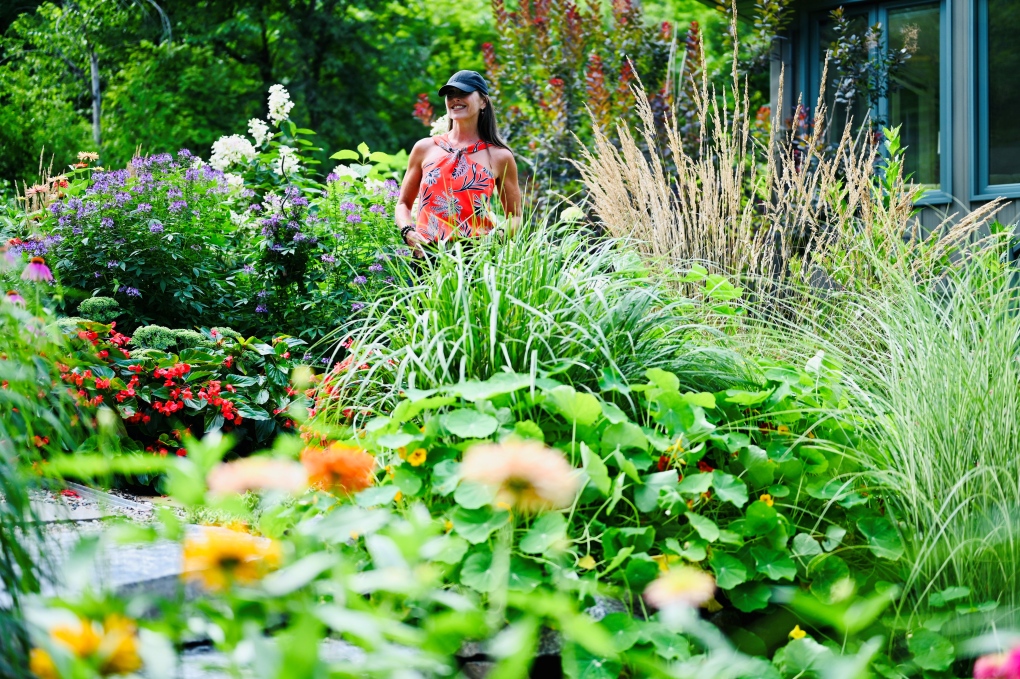 Leanne Cusack immersed in the blooms of her Chelsea, Quebec garden (Joel Haslam/CTV Ottawa)
Leanne Cusack immersed in the blooms of her Chelsea, Quebec garden (Joel Haslam/CTV Ottawa)
In fairness, she used flower pet names for most of her grandchildren.
The names were interchangeable. It was a safe bet. These sweet floral terms of endearment meant she didn’t have to worry about calling us the wrong names. She had a lot of grandchildren. And she cradled each one of us as a treasured bouquet.
When I see hollyhocks, I think of Grammie. Geraniums too.
The smell of geraniums makes me nostalgic for her sweet and earthy East Coast kitchen.
In my experience, a lot of gardeners are big sentimentalists.
Plants remind us of people, experiences and places.
Gardeners like to gift plants, and they like to receive them.
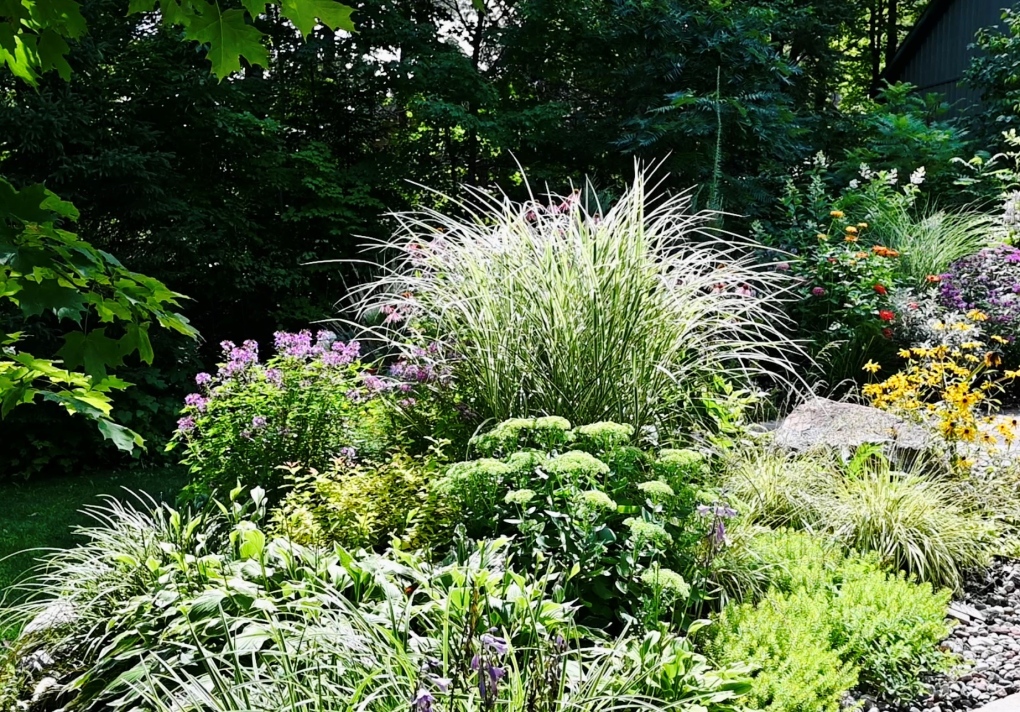 Gifted grasses, sedums and hostas (Joel Haslam CTV Ottawa)
Gifted grasses, sedums and hostas (Joel Haslam CTV Ottawa)
Portions of my Chelsea, Quebec garden are made up of gifted grasses, lilies, hostas, sedums and other perennials generously shared by friends.
I beam when I hear that clumps of Heliopsis I gifted decades ago from my farm garden, are still the stars of friends’ gardens.
I remember the day, I sent my sister-in-law, Joan, off laughing from the farm with a carload-filled with clumps of perennials.
Joan is an ardent gardening enthusiast and she says that day got her hooked. How wonderful to get someone to dig digging!
This is Canada’s “Year of the Garden”. (livethegardenlife.gardenscanada.ca) It’s a great time to share floral enthusiasm; to get someone you know hooked on gardening, or to try your hand at digging in the dirt.
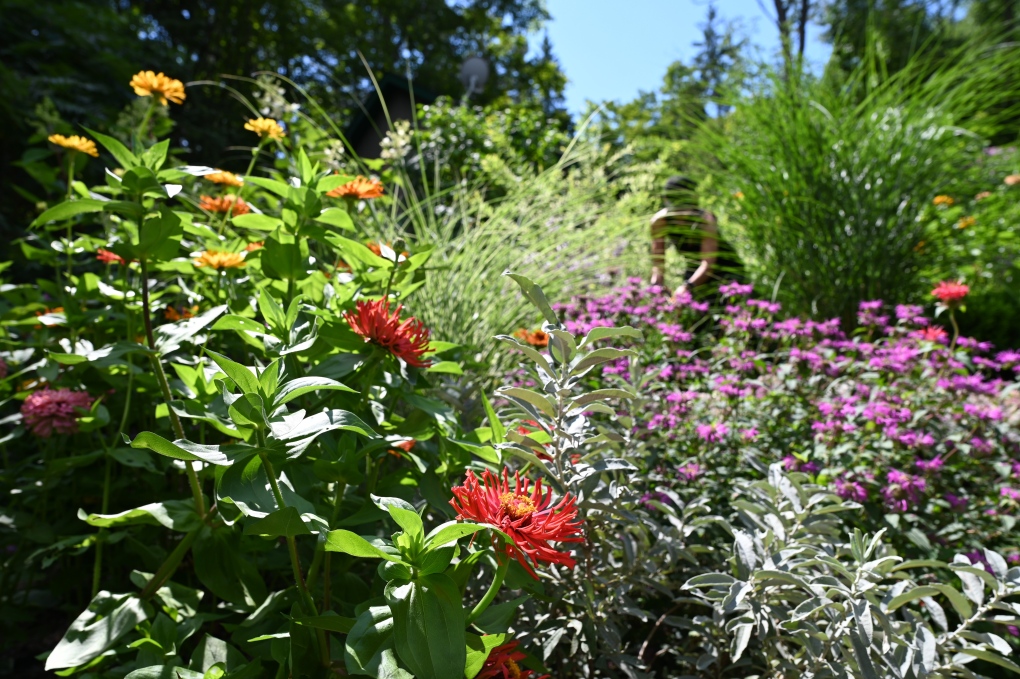 Zinnias are always a prominent floral feature in Leanne Cusack’s garden (Joel Haslam CTV Ottawa)
Zinnias are always a prominent floral feature in Leanne Cusack’s garden (Joel Haslam CTV Ottawa)
You can call it yoga with a shovel.
It’s relaxing, rewarding, meditative and amazing exercise.
And let’s face it, gardening can also be frustrating from time to time. We make mistakes.
Some plants like our soil, some don’t.
Some plants need more light, less light, more shade, They will tell you what they need.
Sometimes the squirrels and chipmunks help us, and some years you will feel like you are being punked, or sabotaged by them.
One day you are wishing for rain, the next day you are staking the tall plants that were pummelled by it.
You can nurture a plant only to have a grasshopper, Japanese Beetle or slug devour it in an instant.
Gardens, though, are mostly a huge source of wonder and joy. I think we all remember being children surrounded by colour and blooms, swept away by delicious fragrances.
These are some tips I hope will help the new gardeners get going and growing. I am happy to share some of the most resilient, reliable and loyal plants you can find in our growing zone. The happy flowers that make me so happy.
I hope this tips bring you more joy and less weeding.
Know what you are giving and receiving: Beware of hitchhikers
For those who like to give perennials, know what you are giving and what you are receiving.
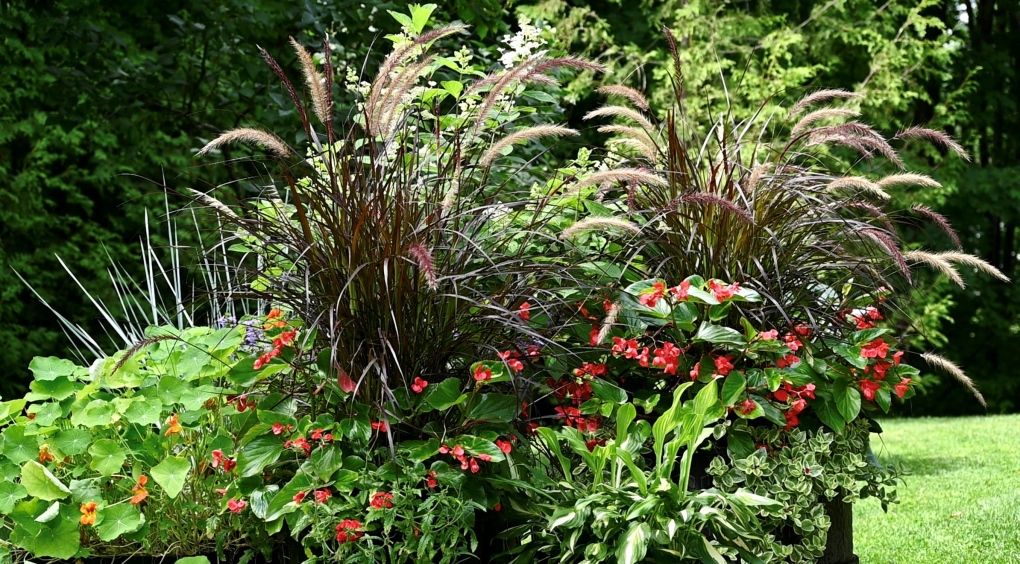 Hosta (front) confined to a container to prevent the spread of “Hitchhiking Goutweed” (Joel Haslam CTV Ottawa)
Hosta (front) confined to a container to prevent the spread of “Hitchhiking Goutweed” (Joel Haslam CTV Ottawa)
If you have plants that have unwelcome hitchhikers, let the recipient know what they are dealing with. Bishop’s weed or Goutweed in a hosta transplant will be an entire bed filled with weeds within a couple of years. I received hostas from a friend who battles the invasive Goutweed. I enjoy the plants but confine them to containers because even after five years, sprigs of invasive weeds continue to pop up.
Remember that a plant that may be a slow starter in your garden may take off in different soil conditions.
Know your spreaders from your clumpers
Ornamental grasses are an absolute favourite of mine. They are elegant and make for an interesting winter feature too.
I learned the hard way, to know your “clumpers” from your “spreaders”.
I have been gifted some gorgeous grasses. They add so much texture to the garden. They dance on the breezes.
Blue Lyme grass is a beauty. It’s also an invasive bully.
When I received it, I put it front and centre in a new bed.
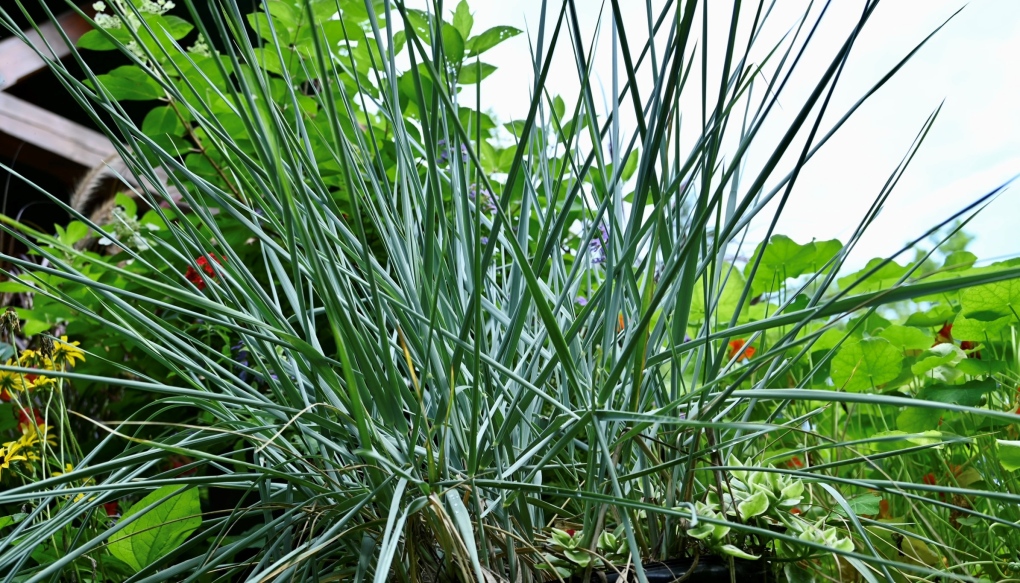 Blue Lyme grass is striking but can be an invasive bully. Leanne Cusack suggests keeping it contained (Joel Haslam CTV Ottawa)
Blue Lyme grass is striking but can be an invasive bully. Leanne Cusack suggests keeping it contained (Joel Haslam CTV Ottawa)
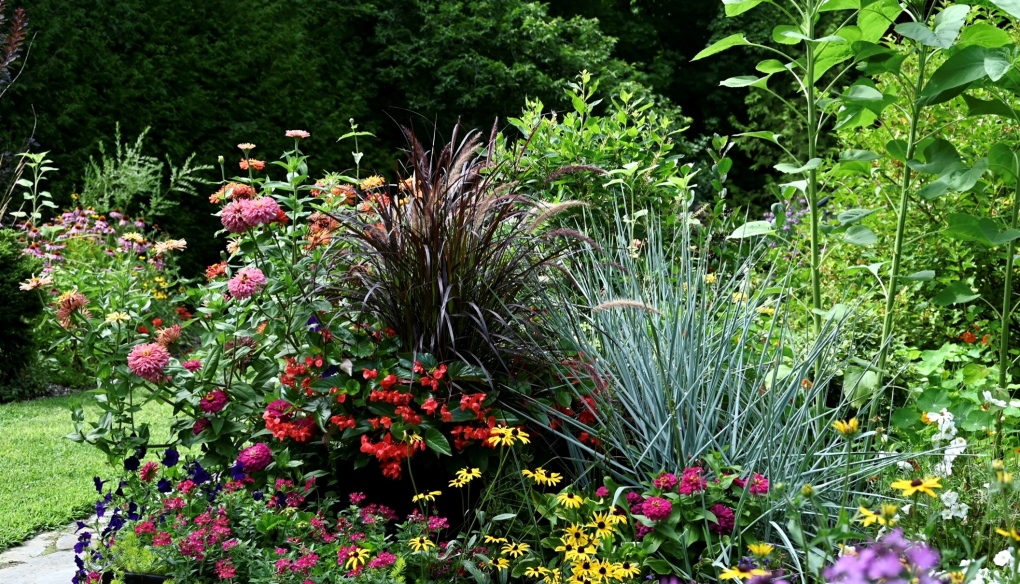 Blue Lyme grass in a pot used in a grouping of containers (CTV Ottawa)
Blue Lyme grass in a pot used in a grouping of containers (CTV Ottawa)
Within a year with its rhizomes (stems and roots that travel, and travel far, horizontally), it started coming up through our laneway. We dug up every bit, every little sprout of a shoot and fired it all in pots and into a forgotten about corner of the property too. It’s beautiful in pots. It creates a spike effect that is quite striking.
So, if someone offers you a piece of ornamental grass, ask about its growth and root spread.
Don't be afraid to put shrubs in containers for the summer and transplant in the fall
This spring I got in on an amazing clearance sale on flowering shrubs. What a deal! I bought a pair of pontentillas for ten dollars each. Three flowering hydrangeas for the same price. I even bought a chokecherry bush.
The garden was already planted with my pops of annual colour so instead of planting the shrubs, for the second season in a row, I created interesting features in large pots.
The shrubs in pots gave a topiary effect with cheap and cheerful annuals at the base.
This fall these new acquisitions will be put in place in beds, so the ten-dollar shrubs mean I won’t be spending on annuals to fill those spaces next spring.
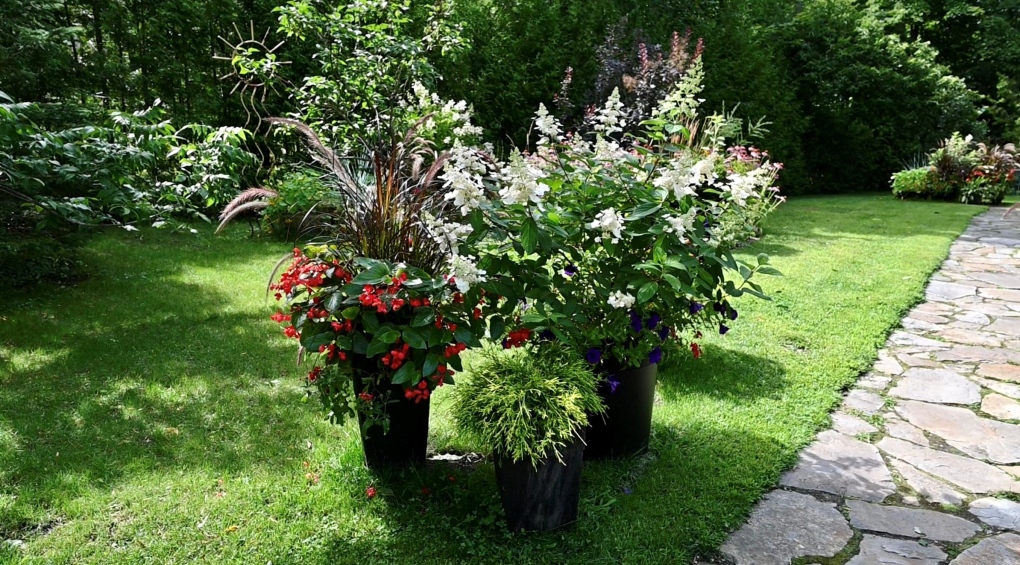 Bargain shrubs planted in containers will be transplanted in the fall. (Joel Haslam CTV Ottawa)
Bargain shrubs planted in containers will be transplanted in the fall. (Joel Haslam CTV Ottawa)
Perennial picks: Low on maintenance and high on joy
RazzMaTazz daylilies are long-blooming, drought tolerant, low maintenance and simply gorgeous. A dear friend gave me these lilies for my birthday. They make me think of her. (Yes, Tina is as vibrant as the beautiful lilies.)
These are a perfect addition for this “Year of the Garden” as the theme colour is red!!—or in this case Razzmatazz RED.
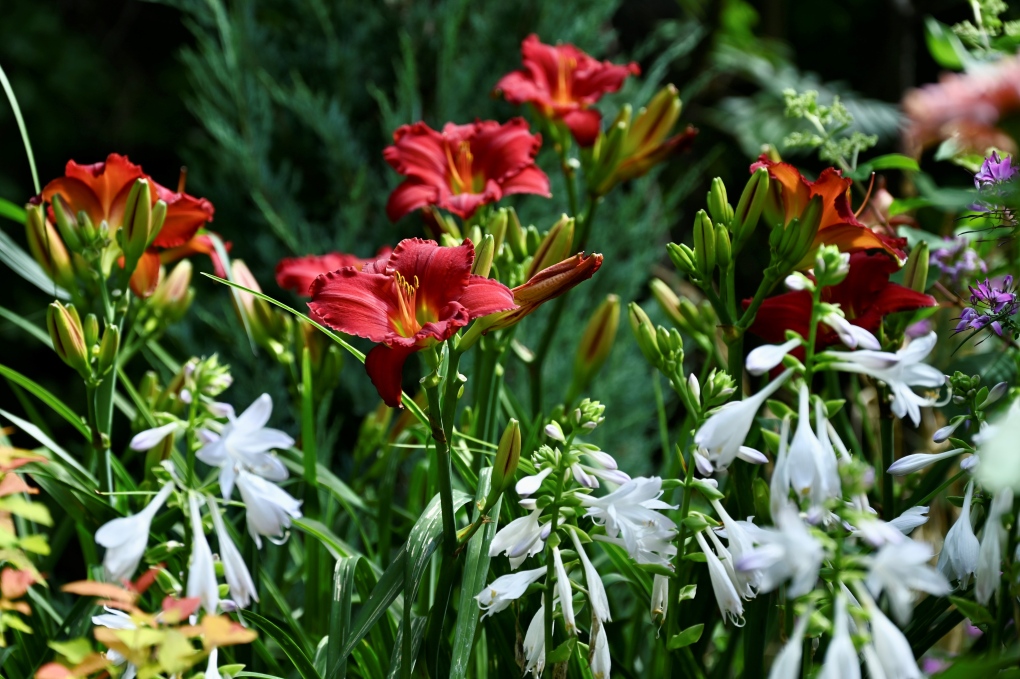 Razzmatazz Lilies: A perfect choice for Canada’s Year of the Garden (Joel Haslam CTV Ottawa)
Razzmatazz Lilies: A perfect choice for Canada’s Year of the Garden (Joel Haslam CTV Ottawa)
Prairie Coreopsis: This hardy plant divides easily, flourishes in full sun, is drought resistant and its mounding feathery shrub-like tendency makes it a happy, low-maintenance performer.
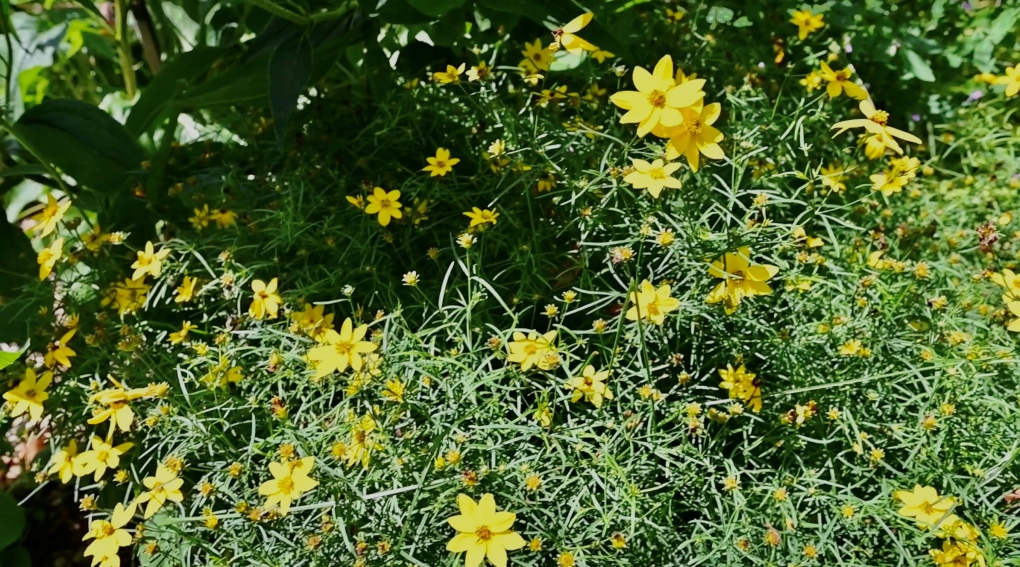 The hardy and drought-resistant Prairie Coreopsis (Joel Haslam CTV Ottawa)
The hardy and drought-resistant Prairie Coreopsis (Joel Haslam CTV Ottawa)
Angelina Sedum or Stonecrop: A little goes a long way:
This ground cover is almost magical. Its blooms are bright yellow, cheerful flowers. It’s secret power though—how hardy it is. You break off a piece, stick it in the soil and it takes root. Better still, it creates roots. This happy little spreader is beautiful along stone walls, or in any little sunny crevice that needs cheering up. I also break off bits and stick it in pots.
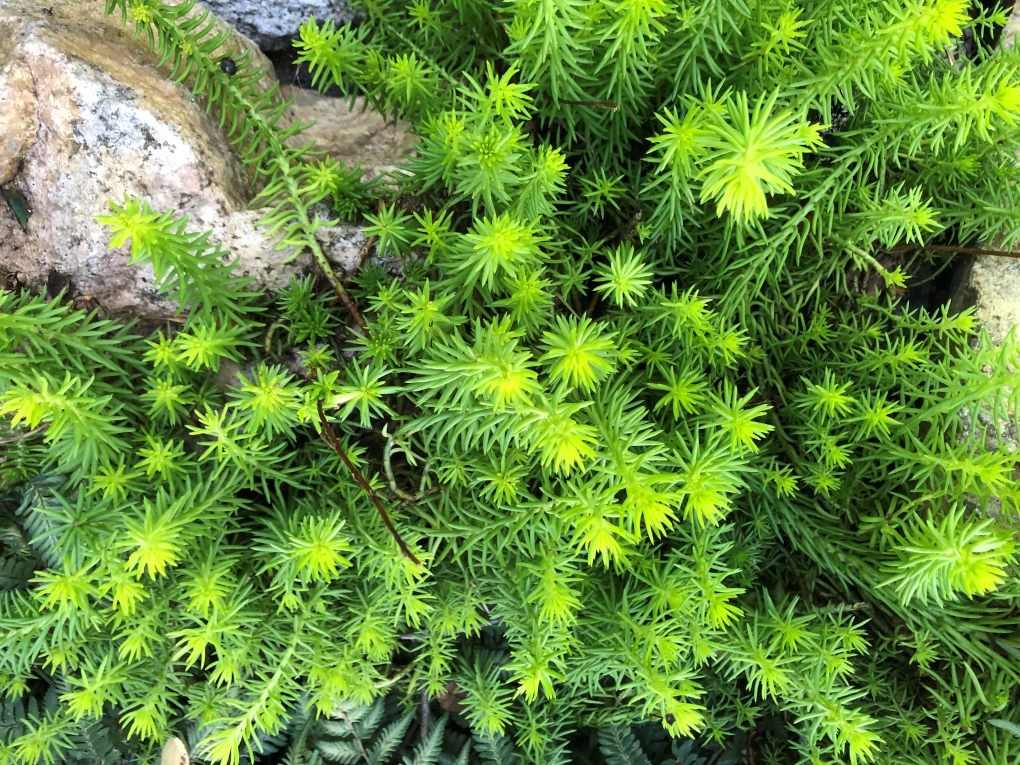 Angelina Sedum or Stonecrop is a magical and tenacious performer (Joel Haslam CTV Ottawa)
Angelina Sedum or Stonecrop is a magical and tenacious performer (Joel Haslam CTV Ottawa)
Strawberry Yarrow-a garden addition that’s easy on the nerves:
If you are looking for a plant that thrives on neglect, this is it. Its pretty blooms are beautiful in cut bouquets. Left in the garden, it’s a long-blooming, drought resistant friend with feathery foliage and a pretty pop of colour
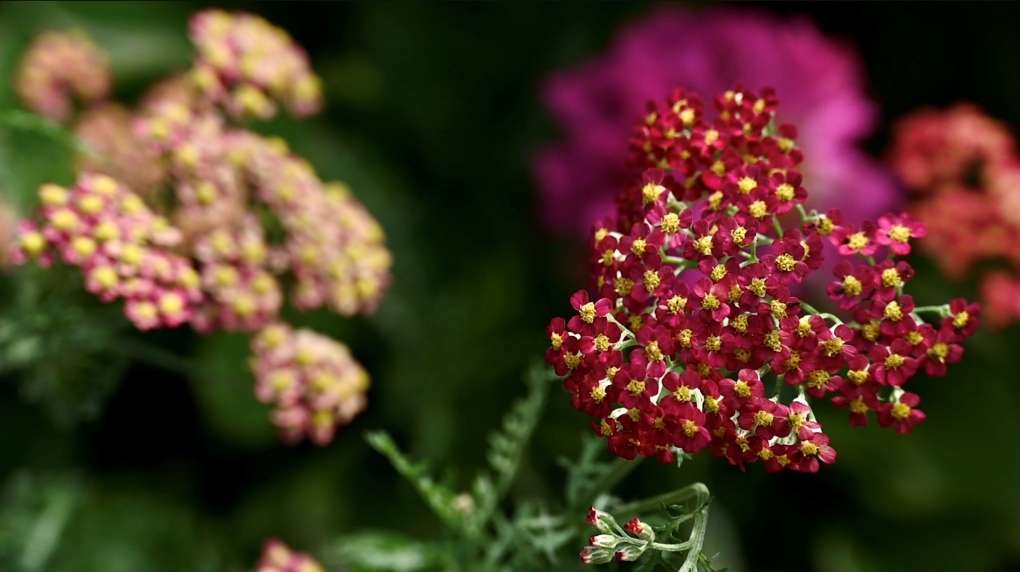 Strawberry Yarrow is beautiful in cut bouquets (Joel Haslam CTV Ottawa)
Strawberry Yarrow is beautiful in cut bouquets (Joel Haslam CTV Ottawa)
Echinacea of all colours: for the birds, bees and bouquets:
Echinacea is all things to all gardeners and to the birds and the bees those gardeners treasure. I have had my original echinacea plants for more than 25 years. I have shared portions and seedlings with countless pals. I just bought an orange variety and am always delighted by the white echinacea I added last year.
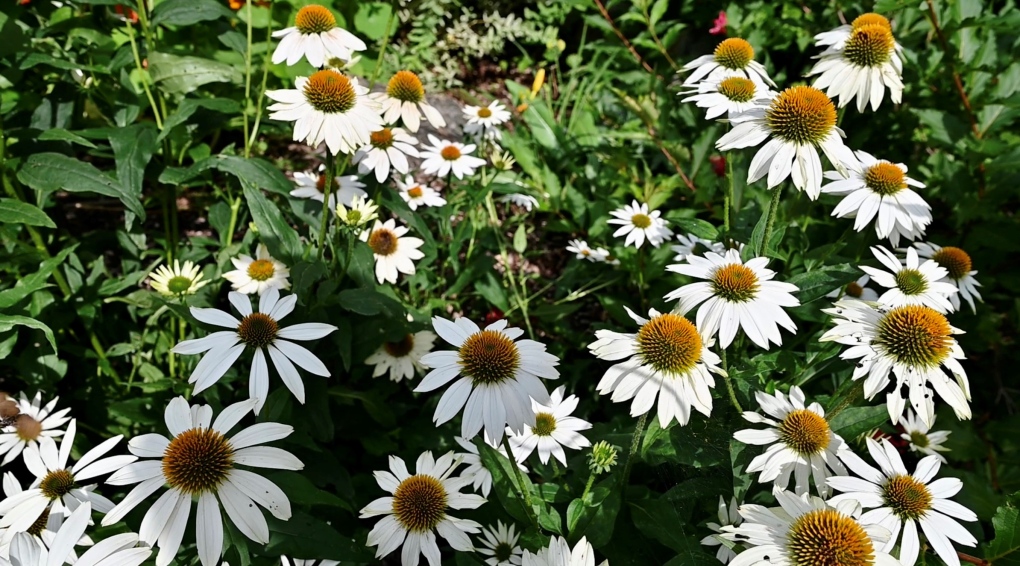 Blooms of white echinacea are a gift to the birds and bees (Joel Haslam CTV Ottawa)
Blooms of white echinacea are a gift to the birds and bees (Joel Haslam CTV Ottawa)
Annuals that pack a perpetual punch of colour & performance:
Dorotheanthus or Mezoo Vine:
I have mentioned this beauty in a past article. It is deserving of another bit of plant praise. It is so resilient and so versatile. You break off a portion, stick it in the soil, give it a splash of water and watch it spread out so cheerfully with its variegated foliage and cheerful bright pink flowers. I bring plants in to over winter and use that “mother plant” as a source for many areas of Mezoo WOW in containers and rockeries.
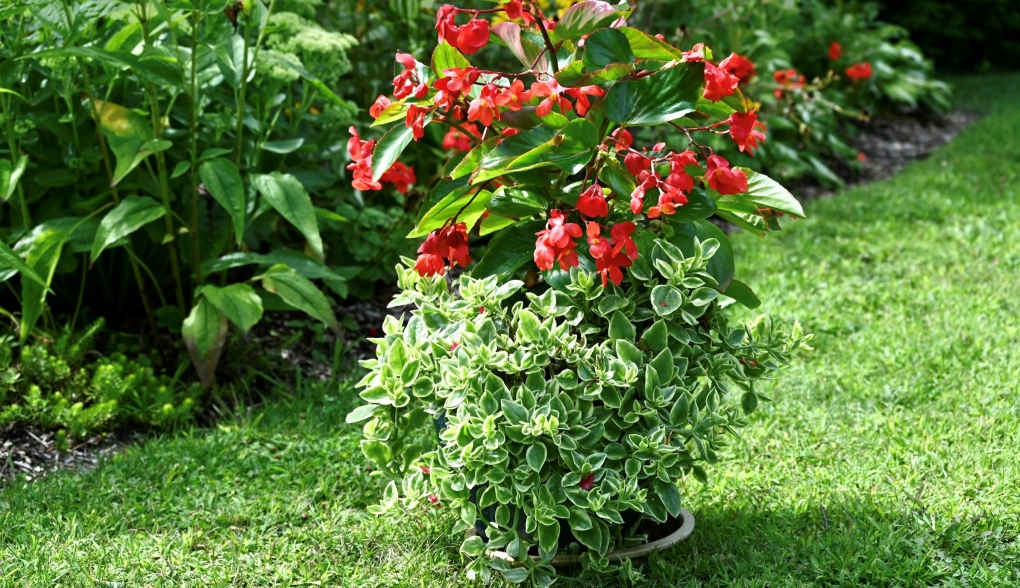 The versatility and resilience of this succulent plant Dorotheanthus Mezoo (Joel Haslam CTV Ottawa)
The versatility and resilience of this succulent plant Dorotheanthus Mezoo (Joel Haslam CTV Ottawa)
More Annual friends you can count on: Not just fair-weather friends:
If you have a lot of ground to cover and you like height, I think cleome (it comes in pink, purple and white) is a great addition. One plant goes a long way but it’s best to plant in groupings of three.
Cleome looks amazing anywhere near zinnias. Zinnias are timeless and they never disappoint. I have planted them from seed. I purchase transplants too. As you cut them for bouquets they just continue to give.
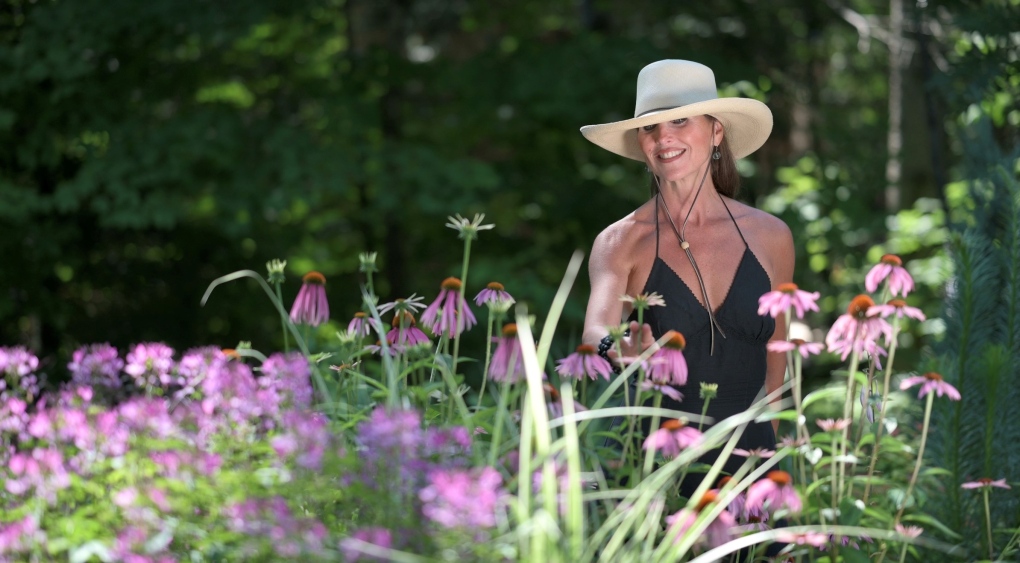 Cleome (left) offers height and constant colour (Joel Haslam CTV Ottawa)
Cleome (left) offers height and constant colour (Joel Haslam CTV Ottawa)
Brace yourself for occasional disappointment: Not all years are created equal.
Sunflowers have long been the show-stealers in my garden. I have always grown them. They teach us to “follow the sun” and stay in the light.
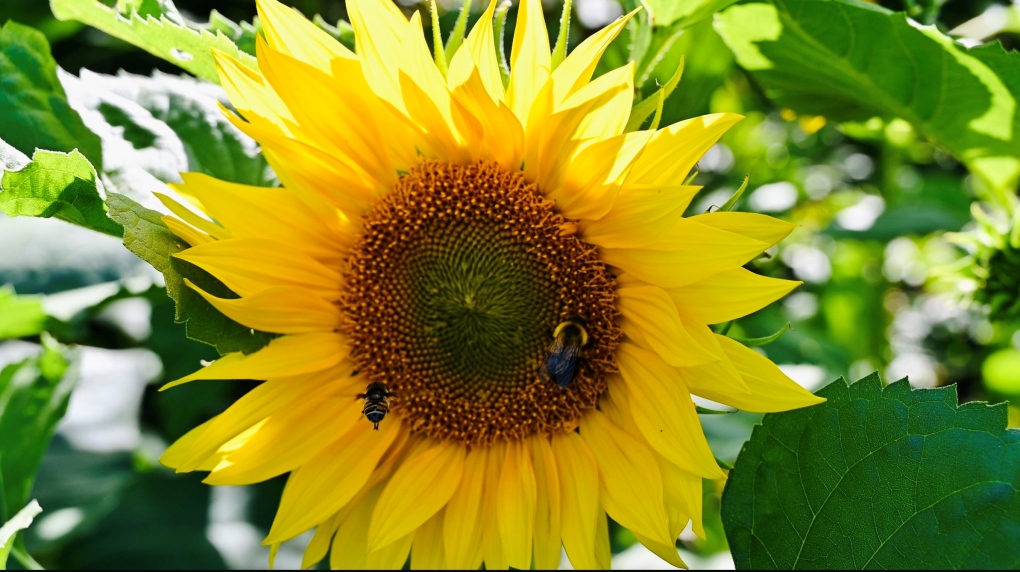 Last Year’s sunflowers (Joel Haslam CTV Ottawa)
Last Year’s sunflowers (Joel Haslam CTV Ottawa)
Often the chipmunks and squirrels bury seeds that I then transplant to a more appropriate spot.
This year we had more squirrels than I have ever witnessed. I called it “Squirrel du Soleil” in the yard.
These acrobats were vandals.
They broke all but six of my 120 seedlings. I even spaced the planting of the seedlings by two week intervals.
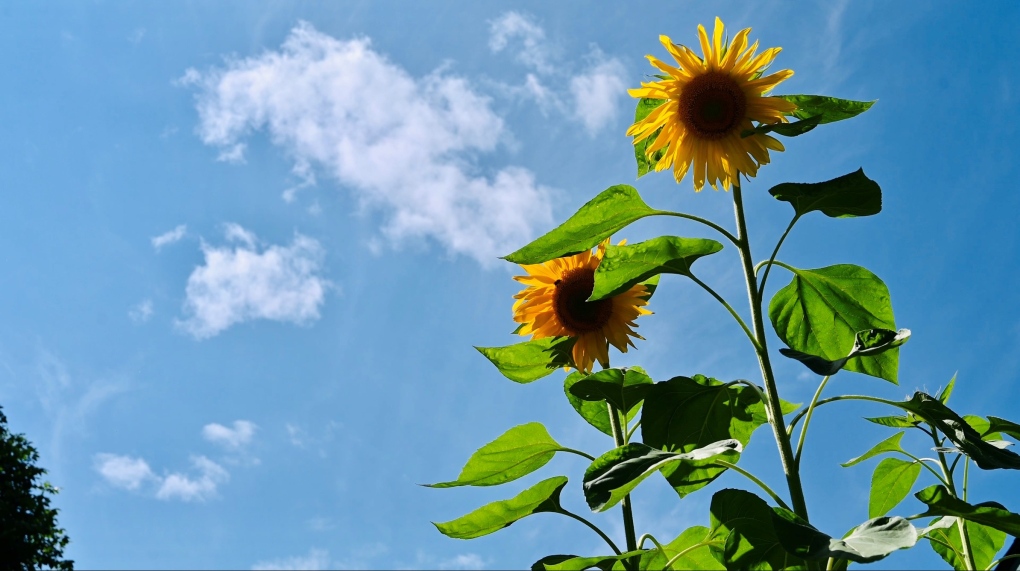 Last year’s sunflowers. This year, they were thwarted by squirrels. (Joel Haslam CTV Ottawa)
Last year’s sunflowers. This year, they were thwarted by squirrels. (Joel Haslam CTV Ottawa)
Poor planning on their part. Disappointing planting on mine. If they had let the sunflowers survive and bloom, those squirrels would be feasting into November. I was without flowers this season and they are without the all-you-can-eat buffet. Guess we are all disappointed.
Some years are bountiful, some years are busts.
My advice? Just roll with it. Focus on the beautiful blooms all around you.
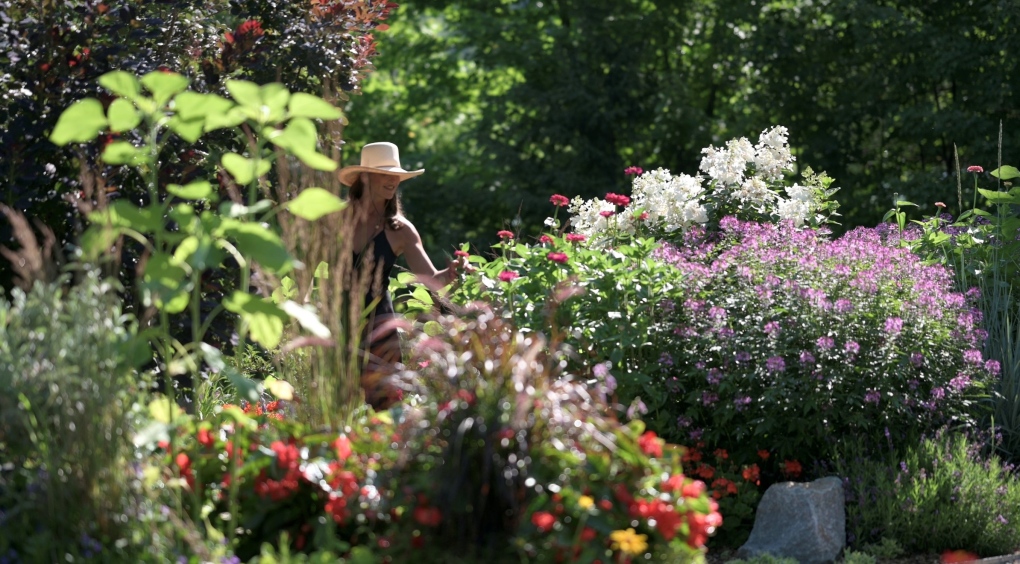 Morning light in Leanne Cusack’s Chelsea garden (Joel Haslam CTV Ottawa)
Morning light in Leanne Cusack’s Chelsea garden (Joel Haslam CTV Ottawa)
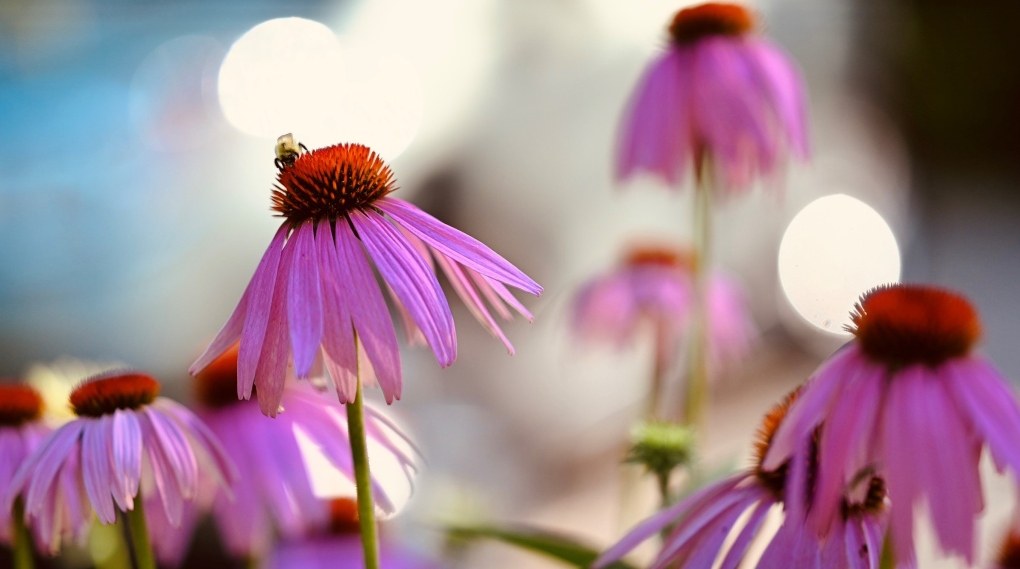 The pollinators feasting on purple echinacea, also known as coneflower (Joel Haslam CTV Ottawa)
The pollinators feasting on purple echinacea, also known as coneflower (Joel Haslam CTV Ottawa)
CTVNews.ca Top Stories
Raised in Sask. after his family fled Hungary, this man spent decades spying on communists for the RCMP
As a Communist Party member in Calgary in the early 1940s, Frank Hadesbeck performed clerical work at the party office, printed leaflets and sold books.
Bird flu, measles top 2025 concerns for Canada's chief public health officer
As we enter 2025, Dr. Theresa Tam has her eye on H5N1 bird flu, an emerging virus that had its first human case in Canada this year.
DEVELOPING Body found in wheel well of plane at Maui airport
A person was found dead in the wheel well of a United Airlines flight to Maui on Tuesday.
Police identify victim of Christmas Day homicide in Hintonburg, charge suspect
The Ottawa Police Service says the victim who has been killed on Christmas Day in Hintonburg has been identified.
Christmas shooting at Phoenix airport leaves 3 people wounded
Police are investigating a Christmas shooting at Sky Harbor Airport in Phoenix that left three people injured by gunfire.
Ship remains stalled on St-Lawrence River north of Montreal
A ship that lost power on the St. Lawrence River on Christmas Eve, remains stationary north of Montreal.
Finland stops Russia-linked vessel over damaged undersea power cable in Baltic Sea
Finnish authorities detained a ship linked to neighboring Russia as they investigate whether it damaged a Baltic Sea power cable and several data cables, police said, in the latest incident involving disruption of key infrastructure.
Your kid is spending too much time on their phone. Here's what to do about it
Wondering what your teen is up to when you're not around? They are likely on YouTube, TikTok, Instagram or Snapchat, according to a new report.
Bird flu kills more than half the big cats at a Washington sanctuary
Bird flu has been on the rise in Washington state and one sanctuary was hit hard: 20 big cats – more than half of the facility’s population – died over the course of weeks.
































